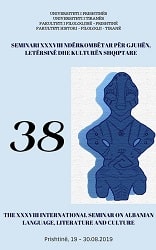Fjala, rrjetet sociale dhe politika
Word, Social Networks and Politics
Author(s): Alfred HalilajSubject(s): Philosophy of Language, Politics and communication, Culture and social structure , Theory of Communication, Crowd Psychology: Mass phenomena and political interactions, Social Informatics
Published by: Univeristeti i Prishtinës, Fakulteti i Filologjisë
Keywords: culture; language; words; ritual; network; politics; power;
Summary/Abstract: There is no more qualitative distinction that places us as human beings in a different order from other beings than language. In her companion role, the word has historically been identified, and people have also been made together. It is centeredas qualities and in the sacred books. In short, its power unites consciousness while joining the actions of people. Politicians have recognized this force and have turned the word into the common practice of persuasion. From memorization of scripture to literacy, from dedicated elite reading to the massive digestion of everyone, from the logic of reasonless obedience to reasonable conviction, the word remains the main instrument of politics. It is always interested in the support of the community of people and the fate and success of any politician depends on the extent of the mass of people who join and follow it. In this context, the use of the word and perseverance to use it is by no means new. At the time of the digital revolution, it changes the scope of application but not the purpose for which it is used in politics. Social networks are the new, old "religion" ritual, politics that, with the skill of the simplicity that digital development offers, turns the word into political message mode. This issue of using the word as an instrument of obedience through the use of social networks and the virtual world will address this work as part of a broader study cycle that seeks to capture the relationship between culture and the internet and vice versa. Using the method of direct observation of the use of networks by politicians, but also the statistical and comparative methods I will try to bring the role that these networks play in Albanian politics at the time of our existence. The sayings of networks are often beyond the realities that arise as beliefs that will inspire change. For this I will use qualitative analyzes but also inductive examples to understand logic and word ratio with power.
Journal: Seminari Ndërkombëtar për Gjuhën, Letërsinë dhe Kulturën Shqiptare
- Issue Year: 2019
- Issue No: 38.2
- Page Range: 268-285
- Page Count: 18
- Language: Albanian

